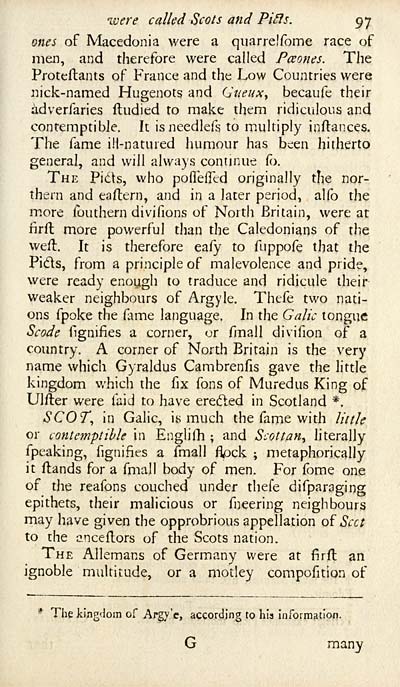Blair Collection > Critical dissertations on the origin, antiquities, language, government, manners, and religion, of the antient Caledonians, their posterity the Picts, and the British and Irish Scots
(135)
Download files
Complete book:
Individual page:
Thumbnail gallery: Grid view | List view

luere called Scots and Pi£is. 97
ones of Macedonia were a quarrelfome race of
men, and therefore were called Pceones. The
Proteftants of France and the Low Countries were
iiick-named Hugenots and Gueux^ becaufe their
adverfaries ftudied to make them ridiculous and
contemptible. It isneedlefs to multiply inftances.
The fame iH-natuied humour has been hitherto
general, and vviJI always continue fo.
The Pids, who poflefTed originally the nor-
thern and eaftern, and in a later period, alfo the
more fouthern divifions of North Britain, were at
nrft more powerful than the Caledonians of the
wefl. It is therefore eafy to fuppofe that the
Pi(fls, from a principle of malevolence and pride,
were ready enough to traduce and ridicule their
weaker neighbours of Argyle. Thefe two nati-
ons fpoke the (lime language. In the Galic tongue
Scode fignifies a corner, or fmall divifion of a
country. A corner of North Britain is the very
name which Gyraldus Cambrenfis gave the little
kingdom which the fix fons of Muredus King of
Ulfter were faid to have erefted in Scotland *.
SCOT^ in Galic, is much the fame with little
or contetnptihk in Englifh ; and Scot tan, literally
fpeaking, fignifies a irnall ftock ; metaphorically
it ftands for a fmall body of men. For Ibme one
of the reafons couched under thefe difparaging
epithets, their malicious or fneering neighbours
may have given the opprobrious appellation oi Sect
to the anceflors of the Scots nation.
The Allemans of Germany were at firfl an
ignoble multitude, or a motley compofition of
The kingdom of Argy'e, according to his inrormation.
G many
ones of Macedonia were a quarrelfome race of
men, and therefore were called Pceones. The
Proteftants of France and the Low Countries were
iiick-named Hugenots and Gueux^ becaufe their
adverfaries ftudied to make them ridiculous and
contemptible. It isneedlefs to multiply inftances.
The fame iH-natuied humour has been hitherto
general, and vviJI always continue fo.
The Pids, who poflefTed originally the nor-
thern and eaftern, and in a later period, alfo the
more fouthern divifions of North Britain, were at
nrft more powerful than the Caledonians of the
wefl. It is therefore eafy to fuppofe that the
Pi(fls, from a principle of malevolence and pride,
were ready enough to traduce and ridicule their
weaker neighbours of Argyle. Thefe two nati-
ons fpoke the (lime language. In the Galic tongue
Scode fignifies a corner, or fmall divifion of a
country. A corner of North Britain is the very
name which Gyraldus Cambrenfis gave the little
kingdom which the fix fons of Muredus King of
Ulfter were faid to have erefted in Scotland *.
SCOT^ in Galic, is much the fame with little
or contetnptihk in Englifh ; and Scot tan, literally
fpeaking, fignifies a irnall ftock ; metaphorically
it ftands for a fmall body of men. For Ibme one
of the reafons couched under thefe difparaging
epithets, their malicious or fneering neighbours
may have given the opprobrious appellation oi Sect
to the anceflors of the Scots nation.
The Allemans of Germany were at firfl an
ignoble multitude, or a motley compofition of
The kingdom of Argy'e, according to his inrormation.
G many
Set display mode to: Large image | Transcription
Images and transcriptions on this page, including medium image downloads, may be used under the Creative Commons Attribution 4.0 International Licence unless otherwise stated. ![]()
| Permanent URL | https://digital.nls.uk/76288096 |
|---|
| Description | A selection of books from a collection of more than 500 titles, mostly on religious and literary topics. Also includes some material dealing with other Celtic languages and societies. Collection created towards the end of the 19th century by Lady Evelyn Stewart Murray. |
|---|
| Description | Selected items from five 'Special and Named Printed Collections'. Includes books in Gaelic and other Celtic languages, works about the Gaels, their languages, literature, culture and history. |
|---|

